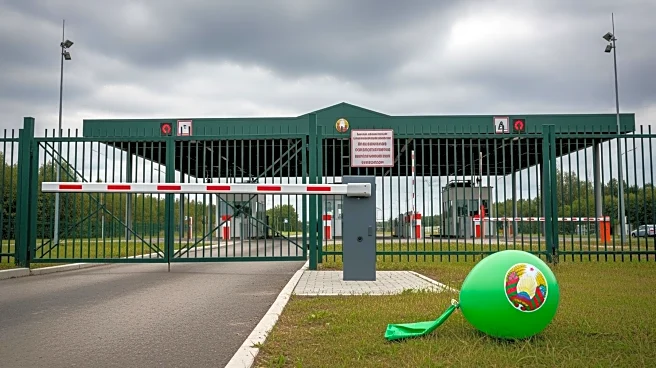What's Happening?
Lithuania is preparing to indefinitely close its border crossings with Belarus following repeated disruptions at Vilnius Airport caused by suspected balloon sightings. These balloons are believed to be used for smuggling cigarettes across the border.
The National Security Commission of Lithuania convened after air traffic at Vilnius Airport was suspended on three consecutive evenings due to these incidents, which also affected the Kaunas airport. The border crossings at Medininkai and Šalčininkai were temporarily closed as a result. Prime Minister Inga Ruginienė announced that the government has drafted a decision to close the border indefinitely, with exceptions for diplomats and diplomatic mail, as well as for Lithuanian and other EU citizens entering from Belarus.
Why It's Important?
The decision to potentially close the border indefinitely highlights the ongoing tensions between Lithuania and Belarus, particularly in the context of security and smuggling issues. As a member of both the EU and NATO, Lithuania's actions could influence broader regional security policies and economic relations. The closure could impact trade and movement between the two countries, affecting businesses and individuals reliant on cross-border activities. Additionally, the situation underscores the use of unconventional methods, such as balloon smuggling, in hybrid aggression tactics, as noted by Belarusian opposition leader Sviatlana Tsikhanouskaya. This move may prompt further sanctions and security measures within the EU against Belarus.
What's Next?
The Lithuanian Cabinet is expected to make a final decision on the indefinite closure of the border on Wednesday. If implemented, this could lead to increased diplomatic tensions and potential retaliatory measures from Belarus. The EU may also consider additional sanctions or support for Lithuania in response to the security threats posed by the smuggling activities. Monitoring the situation will be crucial for stakeholders in the region, including businesses and travelers, as they adapt to potential changes in border policies.
Beyond the Headlines
The use of balloons for smuggling highlights the evolving nature of cross-border crime and the challenges it poses to national security. This incident may lead to increased investment in border security technologies and international cooperation to combat smuggling and other forms of hybrid aggression. The situation also raises questions about the effectiveness of current sanctions and the need for more comprehensive strategies to address the root causes of such activities.

















